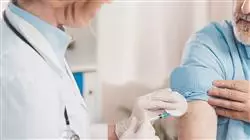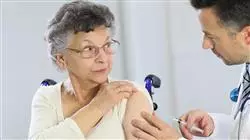University certificate
The world's largest faculty of nursing”
Introduction to the Program
Specialize in immunization epidemiology and add to your nursing education. You will achieve personal and professional growth in a short period of time"

The vaccination process carried out by nursing professionals involves extensive training, since it is not simply the act of pricking, but rather it is necessary to carry out a whole protocol that allows vaccination to be performed with all the guarantees of safety.
With this program, the student will learn everything related to the vaccination act and the immunity process, starting with the history of vaccines and their contextualization in the present time as a basis for a deeper understanding of more specific concepts related to immunity and immunogenicity.
The vaccination process is an act intimately associated with epidemiology as a study, since it relates in terms of health prevention different diseases and its fundamental primary prevention. The basis for understanding vaccines is knowledge of the diseases that cause them, their frequency of occurrence in vulnerable populations and the existing measures for their eradication and prevention. And, therefore, this specialization also aims to train nurses in this field.
The Diploma in Vaccination Process focuses on what might traditionally be expected from a study of the vaccine administration process. it begins with a small contextualization with basic aspects related to the act of vaccination and its legal basis to, once understood, continue with everything related to the transport and conservation of vaccines and the cold chain, concepts necessary prior to the administration of the vaccine and essential for nursing professionals.
Finally, the students Study the future of vaccines: which vaccines are currently in development or in production, which diseases are expected to have a vaccine in the near future, and where they standwith the COVID-19 epidemic in relation to the act of vaccination.
With this program TECH has set out to offer the most comprehensive qualification on vaccination in a simple and easy-to-learn manner. Likewise, as it is a 100% online qualification, the student will have the opportunity to combine their study hours with the rest of their daily obligations, so that they will be able to learn in a comfortable way.
Increase your education in the field of vaccination and improve yourself thanks to this highly academic specialization”
This Postgraduate diploma in Fundamentals and Epidemiology of Immunization. Vaccination Process and its Future contains the most complete and up-to-date scientific program on the market. The most important features include:
- The development of clinical cases presented by vaccine experts
- The graphic, schematic, and practical contents with which they are created provide scientific and practical information on the disciplines that are essential for professional practice
- New developments in vaccinations
- Practical exercises where self-assessment can be used to improve learning
- An algorithm-based interactive learning system for decision-making in the clinical situations presented throughout the course
- Theoretical lessons, questions to the expert, debate forums on controversial topics, and individual reflection assignments
- Content that is accessible from any fixed or portable device with an Internet connection
Our training employs the best teaching methodology and the latest didactic tools, which will allow you to study from home, without sacrificing what is offered by on-site classes”
Its teaching staff includes professionals from the field of Vaccines in Nursing, who bring the experience of their work to this program, as well as recognized specialists from leading scientific societies.
The multimedia content, developed with the latest educational technology, will provide the professional with situated and contextual learning, i.e., a simulated environment that will provide an immersive program designed to learn in real situations.
This program is designed around Problem-Based Learning, whereby the professional must try to solve the different professional practice situations that arise throughout the program. For this purpose, the professional will be assisted by an innovative interactive video system created by renowned and experienced experts in vaccination and extensive experience Teachers.
We offer you the opportunity to study with a multitude of practical cases in such a way that you can learn new skills as if you were dealing with real patients”

This Postgraduate diploma is the best investment you can make in education to acquire the best and most up-to-date education in vaccination"
Why study at TECH?
TECH is the world’s largest online university. With an impressive catalog of more than 14,000 university programs available in 11 languages, it is positioned as a leader in employability, with a 99% job placement rate. In addition, it relies on an enormous faculty of more than 6,000 professors of the highest international renown.

Study at the world's largest online university and guarantee your professional success. The future starts at TECH”
The world’s best online university according to FORBES
The prestigious Forbes magazine, specialized in business and finance, has highlighted TECH as “the world's best online university” This is what they have recently stated in an article in their digital edition in which they echo the success story of this institution, “thanks to the academic offer it provides, the selection of its teaching staff, and an innovative learning method aimed at educating the professionals of the future”
A revolutionary study method, a cutting-edge faculty and a practical focus: the key to TECH's success.
The most complete study plans on the university scene
TECH offers the most complete study plans on the university scene, with syllabuses that cover fundamental concepts and, at the same time, the main scientific advances in their specific scientific areas. In addition, these programs are continuously being updated to guarantee students the academic vanguard and the most in-demand professional skills. In this way, the university's qualifications provide its graduates with a significant advantage to propel their careers to success.
TECH offers the most comprehensive and intensive study plans on the current university scene.
A world-class teaching staff
TECH's teaching staff is made up of more than 6,000 professors with the highest international recognition. Professors, researchers and top executives of multinational companies, including Isaiah Covington, performance coach of the Boston Celtics; Magda Romanska, principal investigator at Harvard MetaLAB; Ignacio Wistumba, chairman of the department of translational molecular pathology at MD Anderson Cancer Center; and D.W. Pine, creative director of TIME magazine, among others.
Internationally renowned experts, specialized in different branches of Health, Technology, Communication and Business, form part of the TECH faculty.
A unique learning method
TECH is the first university to use Relearning in all its programs. It is the best online learning methodology, accredited with international teaching quality certifications, provided by prestigious educational agencies. In addition, this disruptive educational model is complemented with the “Case Method”, thereby setting up a unique online teaching strategy. Innovative teaching resources are also implemented, including detailed videos, infographics and interactive summaries.
TECH combines Relearning and the Case Method in all its university programs to guarantee excellent theoretical and practical learning, studying whenever and wherever you want.
The world's largest online university
TECH is the world’s largest online university. We are the largest educational institution, with the best and widest online educational catalog, one hundred percent online and covering the vast majority of areas of knowledge. We offer a large selection of our own degrees and accredited online undergraduate and postgraduate degrees. In total, more than 14,000 university degrees, in eleven different languages, make us the largest educational largest in the world.
TECH has the world's most extensive catalog of academic and official programs, available in more than 11 languages.
Google Premier Partner
The American technology giant has awarded TECH the Google Google Premier Partner badge. This award, which is only available to 3% of the world's companies, highlights the efficient, flexible and tailored experience that this university provides to students. The recognition as a Google Premier Partner not only accredits the maximum rigor, performance and investment in TECH's digital infrastructures, but also places this university as one of the world's leading technology companies.
Google has positioned TECH in the top 3% of the world's most important technology companies by awarding it its Google Premier Partner badge.
The official online university of the NBA
TECH is the official online university of the NBA. Thanks to our agreement with the biggest league in basketball, we offer our students exclusive university programs, as well as a wide variety of educational resources focused on the business of the league and other areas of the sports industry. Each program is made up of a uniquely designed syllabus and features exceptional guest hosts: professionals with a distinguished sports background who will offer their expertise on the most relevant topics.
TECH has been selected by the NBA, the world's top basketball league, as its official online university.
The top-rated university by its students
Students have positioned TECH as the world's top-rated university on the main review websites, with a highest rating of 4.9 out of 5, obtained from more than 1,000 reviews. These results consolidate TECH as the benchmark university institution at an international level, reflecting the excellence and positive impact of its educational model.” reflecting the excellence and positive impact of its educational model.”
TECH is the world’s top-rated university by its students.
Leaders in employability
TECH has managed to become the leading university in employability. 99% of its students obtain jobs in the academic field they have studied, within one year of completing any of the university's programs. A similar number achieve immediate career enhancement. All this thanks to a study methodology that bases its effectiveness on the acquisition of practical skills, which are absolutely necessary for professional development.
99% of TECH graduates find a job within a year of completing their studies.
Postgraduate Diploma in Fundamentals and Epidemiology of Immunization. Vaccination Process and its Future
One of the fundamental bases for the optimal growth of a person is immunization through the application of vaccines that prevent the appearance of infectious pathologies in the future. Being a practice that requires specific guidelines, knowledge and skills, TECH Global University developed a Postgraduate Diploma in Fundamentals and Epidemiology of Immunization, the Vaccination Process and its Future; specialized in covering all the safety and health guarantees that this process should include. The Postgraduate Diploma is taught in online mode and is composed of a team of experts belonging to the best hospitals in the national territory. In addition, its syllabus stands out for including the most innovative and updated concepts in the market. During the six months of intensive training, you will learn the basic aspects related to the act of inoculation and its legal basis in terms of transport or conservation of the cold chain of a biological; then, you will approach the research methodology at the clinical-care level of each vaccine, and finally, you will study the future of vaccination based on scientific advances (biologicals in development or manufacture). From there, you will gain the necessary intellect to carry out preventive immunization plans that guarantee the integral well-being of all patients.
Specialize in the epidemiological foundations of immunization and vaccination
This program offered by TECH contains the most innovative and updated scientific program in the educational sector; it stands out for its theoretical-practical approach and its relearning methodology, which facilitates the development of the curriculum in a more progressive and efficient way. During the course of the program, you will delve into everything related to vaccines and the process of immunity, associated with epidemiology. In addition, you will delve into the immunological bases on which to carry out vaccination, the types of injections to apply according to the classification determined (systematic and non-systematic vaccines); followed by the different compounds related to vaccines (adjuvants) and the management of each biological in communicable diseases. With the knowledge obtained throughout the program, you will not only be able to work safely in your area, but you will also be able to design health promotion strategies that raise awareness among the population about the importance of vaccines in their life habits.







